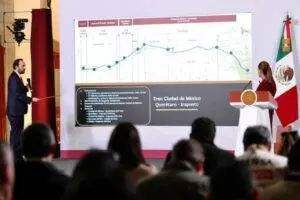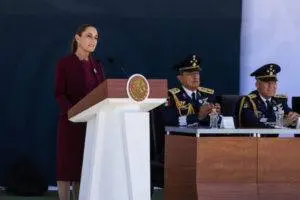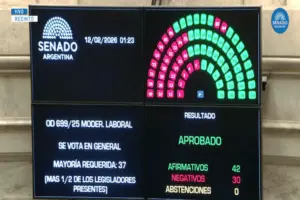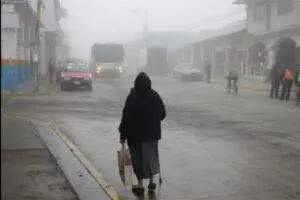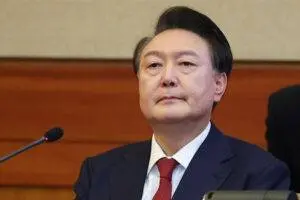By David Raby
This article first appeared in Morning Star.
The landslide victory of Claudia Sheinbaum and Morena (strictly speaking, the Let’s Keep Making History coalition) in the June 2 elections didn’t only leave the mainstream media lost for words, it also left the right-wing opposition in a state of shock.
Despite ritual (and absurd) claims of fraud from some hard-line opponents and formal moves to contest the result, several right-wing commentators have recognised that such actions are futile.
David Raby, participating in “Martes del Jaguar” with Campeche Governor Layda Sansores
There is growing acceptance that Sheinbaum will be the new president and that Morena and its allies have virtually achieved the two-thirds majority in both houses of congress they need to pass constitutional amendments.
Comments from these demoralised critics and international media like the Economist and the New York Times are limited to analysing what they regard as disastrous consequences for Mexico and threats of revenge by financial markets.
But after a few days’ market instability, most investors have recognised that outgoing President Andres Manuel Lopez Obrador’s unorthodox economic policies have been remarkably successful and Sheinbaum’s approach promises to maintain the country’s position as the most prosperous and stable in Latin America.
As Amlo uses his final months to complete major infrastructure projects like the Tren Maya railway and social programmes like the free universal Health for Welfare system, and Sheinbaum tours the country engaging with social organisations and business groups, calmly but firmly explaining her plans, the opposition look incompetent and irrelevant.
As the dust settles, your correspondent has been visiting communities to get a better understanding of the foundations of this dramatic transformation.
Arriving in Campeche State, part of the neglected tropical south-east, I was able to visit a local clinic in Lerma, a working-class town dependent on oil and fishing.
Like a small NHS health centre, the Lerma Clinic already existed before Amlo’s election but was decaying, understaffed and ill-equipped.
As part of the Health for Welfare plan to provide a free, universal high-quality service, it has been completely renovated with state-of-the-art equipment.
As well as basic diagnostic and remedial services it offers treatments one would not expect in a small clinic, such as ultrasound examinations. It also provides a completely free dental service, something we can only dream of in many British dental deserts; and it’s open seven days a week.
Finally, it’s now incorporated into the new The Clinic Is Ours participatory system, under which local communities elect a health committee which receives a development and maintenance budget from the Mexican federal authorities and decide, in consultation with medical personnel, on priorities.
The Lerma Clinic committee was in session when I arrived, and their enthusiasm was immediately apparent. The state health co-ordinator said this was one of 129 such committees in Campeche, and in all of them the treasurer is a woman.
Participants in the Lerma committee showed great enthusiasm to take advantage of this unprecedented opportunity.
The next day I was able to see the Sembrando Vida (Sowing Life) agroforestry scheme in operation. Peasant smallholders with tiny plots of 2.5 hectares receive monthly grants and technical support to improve cultivation of subsistence crops using organic methods, and combine this with planting trees whether for fruit, timber or long-term reforestation of hardwoods like teak and mahogany.
A group of 20 to 25 such smallholders collectively benefit from a nursery of maybe 20 hectares, also with scientific advice and support.
In such a Sowing Life nursery near the town of Champoton, Marco, the treasurer/co-ordinator of a group of 23 families, explained how in three years their prospects had been transformed.
Where previously their small plots were often abandoned or sold for lack of means to sustain cultivation, now they were producing various crops for subsistence and sometimes surplus for sale.
The forestry aspect was providing fruit and timber for both use and sale, and providing shade and other environmental benefits.
“President Lopez Obrador saw the need to help the poorest peasants, this had never been done before,” said Marcos. Now the community is so highly motivated they even do social work for their neighbours once a month.
Sowing Life has assisted 440,000 families and reforested 1.2 million hectares so far in Mexico.
With this and other programmes to support the poor, no wonder they vote for continuation of the Fourth Transformation (the other three being the war of independence (from Spain) 1810-21, the reform war 1858-61 led by president Benito Juarez and the revolution itself led by Francisco Madero and Emiliano Zapata).
Also of general benefit are Amlo’s infrastructure projects: more than half of the Tren Maya railway’s 1,550km route is now functioning, and I rode on Tren Maya to reach Campeche.
With modern technology and design it brings broad economic and social benefits to the region, and in keeping with the Fourth Transformation’s ideals — fares for Mexicans are half what I had to pay as a foreign visitor.
Another scheme of general benefit is the public Welfare Bank (Banco del Bienestar) with over 3,000 branches across the country. The most extensive banking network in Mexico, it provides basic financial services to millions in remote communities, liberating them from the exploitative practices of commercial banks.
Remarkably, it was just given the highest rating by Moody’s for its social functions, financial stability and efficiency.
These are just some of the reasons why people voted en masse for Amlo’s legacy, for Sheinbaum and to “Keep Making History” with the Fourth Transformation.
David Raby is a retired academic in Latin American History and Politics, writer and journalist in solidarity with progressive movements and governments in Latin America, and coordinator of the UK-based Mexico Solidarity Forum.




